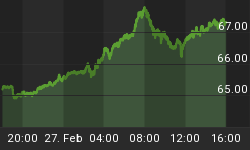Scanning the horizon of the investment world, it is becoming increasingly easy to distinguish a coming wave of inflation and economic growth, which should be arriving in the not-so-distant future. Though many academics and 'market experts' have lately debated the likelihood of deflation, they seem to be chasing the train's caboose.
As many will [hopefully] come to learn, the United States has been in undergoing deflation (defined as shrinking money supply, in this case M3) for the last year. This has been the result of demand for loans drying up as businesses refuse to carry the burden of added debt. Money simply hasn't been turning over in the US economy; not even the billions of dollars the government created in response to the 2008 financial crisis.
After all, the government fed money to so many troubled banks, and then offered to pay them interest if they held that money in the Federal Reserve System as excess reserves. Why, then, would the banks ever want to walk away from riskless interest income to lend out money, when it might not be paid back? Where's the incentive?
Despite this apparent lapse in judgment, the market has been responding well lately as anti-business rhetoric has calmed down substantially. Corporations are beginning to form a clearer picture of the world they now face, and their investors seem to be gaining confidence for their prospects going forward, as evidenced by stock prices.
In fact, many corporations have lately begun issuing high-yield, or so-called "junk" bonds. As many investors fear a double-dip recession, these risky instruments that pay higher-than-average interest rates have been flying off the shelves in recent weeks.
Many corporations have been using cash raised from these issues to pay off debt they had outstanding at higher interest rates, while others are simply stockpiling cash for future expansions projects. In either case, the decision for many of these companies to issue such debt has been wise. Unfortunately, the decision for investors to buy such debt will have terrible results.
As we've detailed in previous articles, the odds of our economy seeing a double-dip are low, and falling every day, making this protection unnecessary for investors. Even more importantly, however, is the fact that interest rates are currently at long-term lows. Investors buying bonds now will see the values of their bonds decline substantially once interest rates begin to climb.
Even investors looking to hold their bonds until they mature (these investors wouldn't be unaffected by rising interest rates) will find themselves exposed in high-yield bonds. That's because junk bonds are a form of subordinated debt. As creditors, junk-bond-holders will find themselves rather far down on the totem pole. In fact, they'll probably be the first creditors to get stiffed if their companies ever run into financial difficulty.
As stated above, we see inflation as being much more likely going forward than its counterpart. This does NOT mean, though, that we are calling for the end of the dollar. In fact, we doubt people will suffer as a result, at least not any more than people are suffering today, despite the fact that the dollars they hold are worth only a tiny fraction of what they were more than a century ago.
Unfortunately, the biggest hindrance to most investors today is not a lack of information, but a surplus. Few realize that just as education does not inherently bestow intelligence, more information does not necessarily import more knowledge. Never before in history has information been more widely available than it has been for the last ten years or so; and yet the markets as a whole have declined in value during that time. The average investor, despite so much information at their fingertips, is worse off.
If more information were necessarily an advantage, Warren Buffett would be sweeping streets in Omaha, and traders on the floor of exchanges would be the wealthiest folks in the world. The rest of us would be penniless. Look no further than Long-Term Capital Management. Never before in history had such an amalgamation of doctorates, researchers, and Nobel Laureates ever been assembled. LTCM was a man amongst boys in terms of access to information, and even that could not save the firm or its investors.
In Ubiquity, author Mark Buchanan cites numerous academic studies to arrive at the conclusion (one of many) that more information, particularly irrelevant information, actually causes people to decrease the accuracy of their decisions, while simultaneously increasing the confidence in their choices. In other words, more information makes people feel more confident in their poor decisions.
The lesson, then, is that investors need to be careful to do their own research, but to avoid exposing themselves to so much information that they (a) obscure the nature of the markets, or (b) grow arrogant. Either of these results is extremely dangerous financially, but both of them together can be catastrophic.















